Framework Analysis: Therapeutic Relationships in Palliative Care
VerifiedAdded on 2019/10/18
|6
|2960
|145
Essay
AI Summary
This essay provides an overview of therapeutic relationships within the context of palliative care. It emphasizes the crucial role of communication in building trust and providing support to patients and their families facing life-threatening illnesses. The essay discusses the importance of age-related palliative approaches, the nurse's role in providing physical, emotional, and spiritual support, and the significance of effective communication skills in developing interpersonal relationships. It highlights the principles of therapeutic communication, including active listening, non-verbal cues, and the use of appropriate medical terminology. The essay also explores the role of the Gerontological Nurse Practitioner (GNP) in palliative care, including their ability to educate, train, and provide psychological support to families. Furthermore, it addresses the need for integrated care pathways, symptom control, and the importance of addressing communication barriers surrounding end-of-life care. The essay concludes by emphasizing the significance of therapeutic relationships as the core of nursing practice and the need for healthcare professionals to develop and maintain strong communication skills in order to provide optimal patient care and support during challenging times.
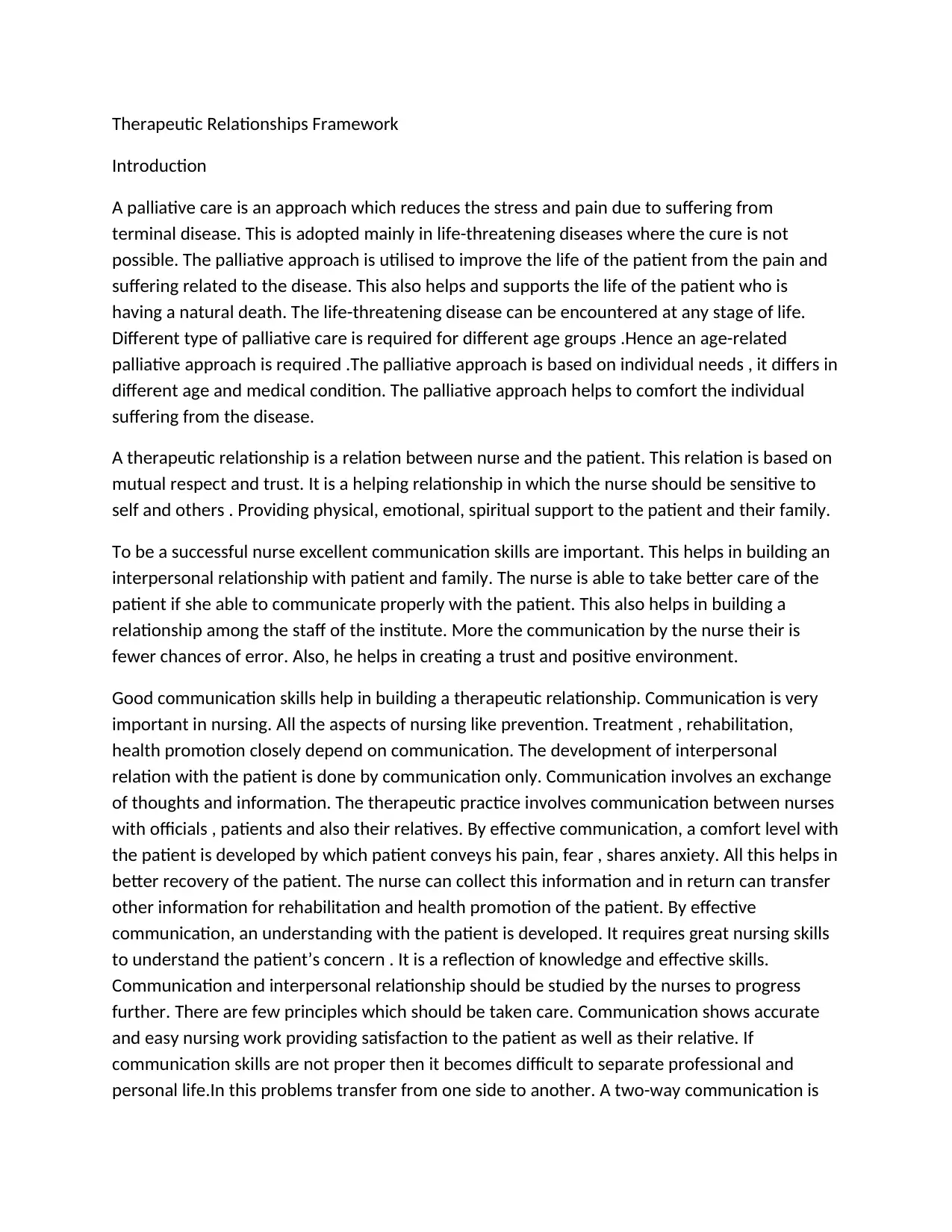
Therapeutic Relationships Framework
Introduction
A palliative care is an approach which reduces the stress and pain due to suffering from
terminal disease. This is adopted mainly in life-threatening diseases where the cure is not
possible. The palliative approach is utilised to improve the life of the patient from the pain and
suffering related to the disease. This also helps and supports the life of the patient who is
having a natural death. The life-threatening disease can be encountered at any stage of life.
Different type of palliative care is required for different age groups .Hence an age-related
palliative approach is required .The palliative approach is based on individual needs , it differs in
different age and medical condition. The palliative approach helps to comfort the individual
suffering from the disease.
A therapeutic relationship is a relation between nurse and the patient. This relation is based on
mutual respect and trust. It is a helping relationship in which the nurse should be sensitive to
self and others . Providing physical, emotional, spiritual support to the patient and their family.
To be a successful nurse excellent communication skills are important. This helps in building an
interpersonal relationship with patient and family. The nurse is able to take better care of the
patient if she able to communicate properly with the patient. This also helps in building a
relationship among the staff of the institute. More the communication by the nurse their is
fewer chances of error. Also, he helps in creating a trust and positive environment.
Good communication skills help in building a therapeutic relationship. Communication is very
important in nursing. All the aspects of nursing like prevention. Treatment , rehabilitation,
health promotion closely depend on communication. The development of interpersonal
relation with the patient is done by communication only. Communication involves an exchange
of thoughts and information. The therapeutic practice involves communication between nurses
with officials , patients and also their relatives. By effective communication, a comfort level with
the patient is developed by which patient conveys his pain, fear , shares anxiety. All this helps in
better recovery of the patient. The nurse can collect this information and in return can transfer
other information for rehabilitation and health promotion of the patient. By effective
communication, an understanding with the patient is developed. It requires great nursing skills
to understand the patient’s concern . It is a reflection of knowledge and effective skills.
Communication and interpersonal relationship should be studied by the nurses to progress
further. There are few principles which should be taken care. Communication shows accurate
and easy nursing work providing satisfaction to the patient as well as their relative. If
communication skills are not proper then it becomes difficult to separate professional and
personal life.In this problems transfer from one side to another. A two-way communication is
Introduction
A palliative care is an approach which reduces the stress and pain due to suffering from
terminal disease. This is adopted mainly in life-threatening diseases where the cure is not
possible. The palliative approach is utilised to improve the life of the patient from the pain and
suffering related to the disease. This also helps and supports the life of the patient who is
having a natural death. The life-threatening disease can be encountered at any stage of life.
Different type of palliative care is required for different age groups .Hence an age-related
palliative approach is required .The palliative approach is based on individual needs , it differs in
different age and medical condition. The palliative approach helps to comfort the individual
suffering from the disease.
A therapeutic relationship is a relation between nurse and the patient. This relation is based on
mutual respect and trust. It is a helping relationship in which the nurse should be sensitive to
self and others . Providing physical, emotional, spiritual support to the patient and their family.
To be a successful nurse excellent communication skills are important. This helps in building an
interpersonal relationship with patient and family. The nurse is able to take better care of the
patient if she able to communicate properly with the patient. This also helps in building a
relationship among the staff of the institute. More the communication by the nurse their is
fewer chances of error. Also, he helps in creating a trust and positive environment.
Good communication skills help in building a therapeutic relationship. Communication is very
important in nursing. All the aspects of nursing like prevention. Treatment , rehabilitation,
health promotion closely depend on communication. The development of interpersonal
relation with the patient is done by communication only. Communication involves an exchange
of thoughts and information. The therapeutic practice involves communication between nurses
with officials , patients and also their relatives. By effective communication, a comfort level with
the patient is developed by which patient conveys his pain, fear , shares anxiety. All this helps in
better recovery of the patient. The nurse can collect this information and in return can transfer
other information for rehabilitation and health promotion of the patient. By effective
communication, an understanding with the patient is developed. It requires great nursing skills
to understand the patient’s concern . It is a reflection of knowledge and effective skills.
Communication and interpersonal relationship should be studied by the nurses to progress
further. There are few principles which should be taken care. Communication shows accurate
and easy nursing work providing satisfaction to the patient as well as their relative. If
communication skills are not proper then it becomes difficult to separate professional and
personal life.In this problems transfer from one side to another. A two-way communication is
Paraphrase This Document
Need a fresh take? Get an instant paraphrase of this document with our AI Paraphraser
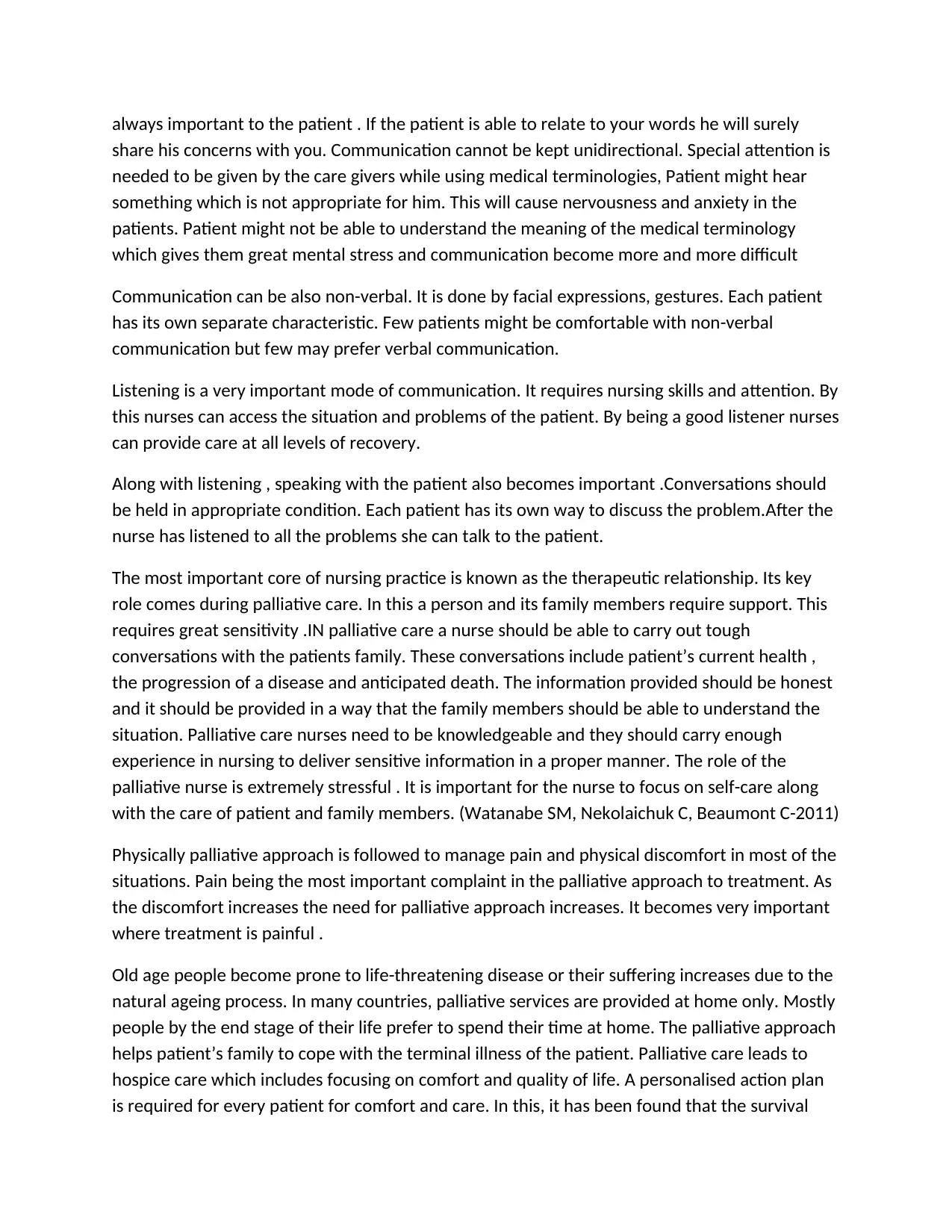
always important to the patient . If the patient is able to relate to your words he will surely
share his concerns with you. Communication cannot be kept unidirectional. Special attention is
needed to be given by the care givers while using medical terminologies, Patient might hear
something which is not appropriate for him. This will cause nervousness and anxiety in the
patients. Patient might not be able to understand the meaning of the medical terminology
which gives them great mental stress and communication become more and more difficult
Communication can be also non-verbal. It is done by facial expressions, gestures. Each patient
has its own separate characteristic. Few patients might be comfortable with non-verbal
communication but few may prefer verbal communication.
Listening is a very important mode of communication. It requires nursing skills and attention. By
this nurses can access the situation and problems of the patient. By being a good listener nurses
can provide care at all levels of recovery.
Along with listening , speaking with the patient also becomes important .Conversations should
be held in appropriate condition. Each patient has its own way to discuss the problem.After the
nurse has listened to all the problems she can talk to the patient.
The most important core of nursing practice is known as the therapeutic relationship. Its key
role comes during palliative care. In this a person and its family members require support. This
requires great sensitivity .IN palliative care a nurse should be able to carry out tough
conversations with the patients family. These conversations include patient’s current health ,
the progression of a disease and anticipated death. The information provided should be honest
and it should be provided in a way that the family members should be able to understand the
situation. Palliative care nurses need to be knowledgeable and they should carry enough
experience in nursing to deliver sensitive information in a proper manner. The role of the
palliative nurse is extremely stressful . It is important for the nurse to focus on self-care along
with the care of patient and family members. (Watanabe SM, Nekolaichuk C, Beaumont C-2011)
Physically palliative approach is followed to manage pain and physical discomfort in most of the
situations. Pain being the most important complaint in the palliative approach to treatment. As
the discomfort increases the need for palliative approach increases. It becomes very important
where treatment is painful .
Old age people become prone to life-threatening disease or their suffering increases due to the
natural ageing process. In many countries, palliative services are provided at home only. Mostly
people by the end stage of their life prefer to spend their time at home. The palliative approach
helps patient’s family to cope with the terminal illness of the patient. Palliative care leads to
hospice care which includes focusing on comfort and quality of life. A personalised action plan
is required for every patient for comfort and care. In this, it has been found that the survival
share his concerns with you. Communication cannot be kept unidirectional. Special attention is
needed to be given by the care givers while using medical terminologies, Patient might hear
something which is not appropriate for him. This will cause nervousness and anxiety in the
patients. Patient might not be able to understand the meaning of the medical terminology
which gives them great mental stress and communication become more and more difficult
Communication can be also non-verbal. It is done by facial expressions, gestures. Each patient
has its own separate characteristic. Few patients might be comfortable with non-verbal
communication but few may prefer verbal communication.
Listening is a very important mode of communication. It requires nursing skills and attention. By
this nurses can access the situation and problems of the patient. By being a good listener nurses
can provide care at all levels of recovery.
Along with listening , speaking with the patient also becomes important .Conversations should
be held in appropriate condition. Each patient has its own way to discuss the problem.After the
nurse has listened to all the problems she can talk to the patient.
The most important core of nursing practice is known as the therapeutic relationship. Its key
role comes during palliative care. In this a person and its family members require support. This
requires great sensitivity .IN palliative care a nurse should be able to carry out tough
conversations with the patients family. These conversations include patient’s current health ,
the progression of a disease and anticipated death. The information provided should be honest
and it should be provided in a way that the family members should be able to understand the
situation. Palliative care nurses need to be knowledgeable and they should carry enough
experience in nursing to deliver sensitive information in a proper manner. The role of the
palliative nurse is extremely stressful . It is important for the nurse to focus on self-care along
with the care of patient and family members. (Watanabe SM, Nekolaichuk C, Beaumont C-2011)
Physically palliative approach is followed to manage pain and physical discomfort in most of the
situations. Pain being the most important complaint in the palliative approach to treatment. As
the discomfort increases the need for palliative approach increases. It becomes very important
where treatment is painful .
Old age people become prone to life-threatening disease or their suffering increases due to the
natural ageing process. In many countries, palliative services are provided at home only. Mostly
people by the end stage of their life prefer to spend their time at home. The palliative approach
helps patient’s family to cope with the terminal illness of the patient. Palliative care leads to
hospice care which includes focusing on comfort and quality of life. A personalised action plan
is required for every patient for comfort and care. In this, it has been found that the survival
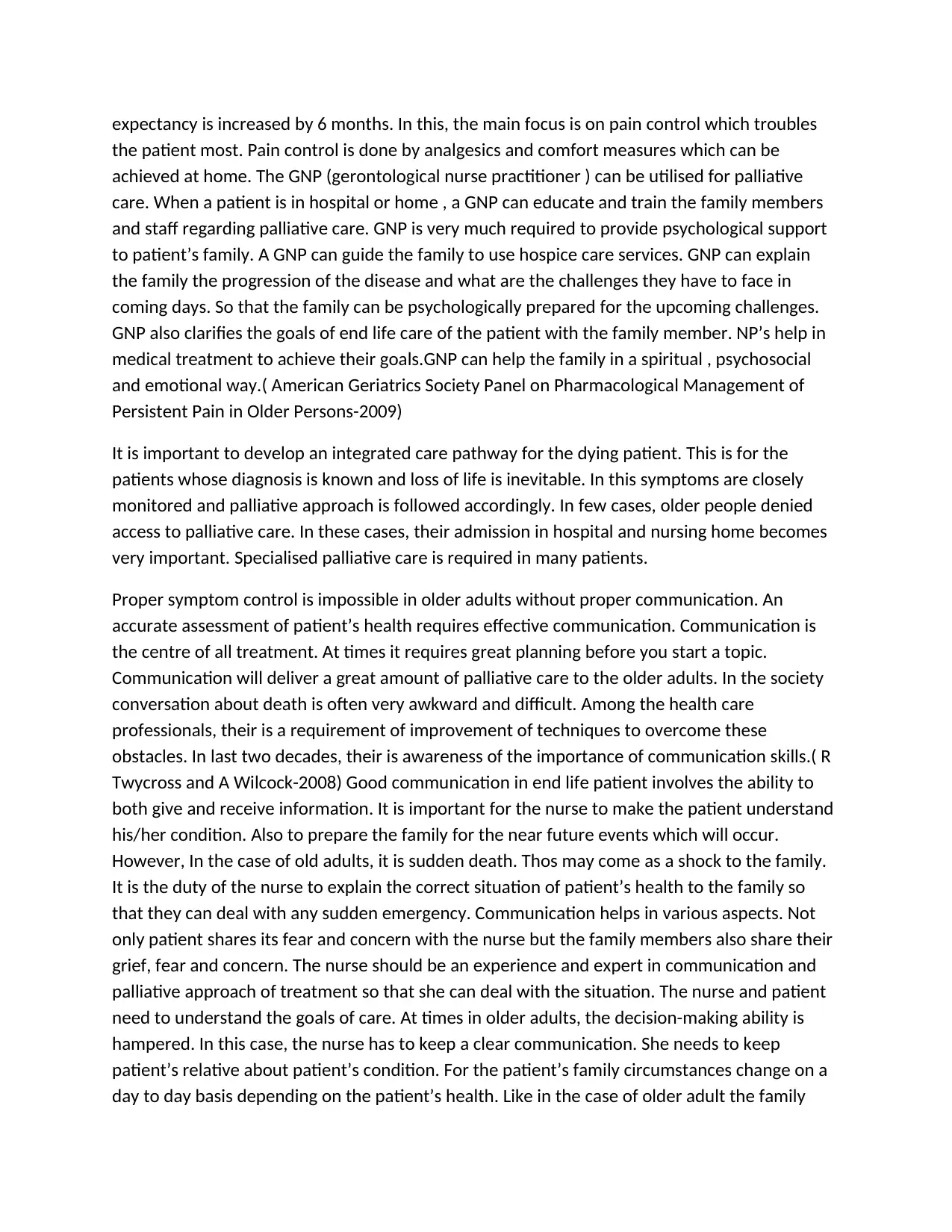
expectancy is increased by 6 months. In this, the main focus is on pain control which troubles
the patient most. Pain control is done by analgesics and comfort measures which can be
achieved at home. The GNP (gerontological nurse practitioner ) can be utilised for palliative
care. When a patient is in hospital or home , a GNP can educate and train the family members
and staff regarding palliative care. GNP is very much required to provide psychological support
to patient’s family. A GNP can guide the family to use hospice care services. GNP can explain
the family the progression of the disease and what are the challenges they have to face in
coming days. So that the family can be psychologically prepared for the upcoming challenges.
GNP also clarifies the goals of end life care of the patient with the family member. NP’s help in
medical treatment to achieve their goals.GNP can help the family in a spiritual , psychosocial
and emotional way.( American Geriatrics Society Panel on Pharmacological Management of
Persistent Pain in Older Persons-2009)
It is important to develop an integrated care pathway for the dying patient. This is for the
patients whose diagnosis is known and loss of life is inevitable. In this symptoms are closely
monitored and palliative approach is followed accordingly. In few cases, older people denied
access to palliative care. In these cases, their admission in hospital and nursing home becomes
very important. Specialised palliative care is required in many patients.
Proper symptom control is impossible in older adults without proper communication. An
accurate assessment of patient’s health requires effective communication. Communication is
the centre of all treatment. At times it requires great planning before you start a topic.
Communication will deliver a great amount of palliative care to the older adults. In the society
conversation about death is often very awkward and difficult. Among the health care
professionals, their is a requirement of improvement of techniques to overcome these
obstacles. In last two decades, their is awareness of the importance of communication skills.( R
Twycross and A Wilcock-2008) Good communication in end life patient involves the ability to
both give and receive information. It is important for the nurse to make the patient understand
his/her condition. Also to prepare the family for the near future events which will occur.
However, In the case of old adults, it is sudden death. Thos may come as a shock to the family.
It is the duty of the nurse to explain the correct situation of patient’s health to the family so
that they can deal with any sudden emergency. Communication helps in various aspects. Not
only patient shares its fear and concern with the nurse but the family members also share their
grief, fear and concern. The nurse should be an experience and expert in communication and
palliative approach of treatment so that she can deal with the situation. The nurse and patient
need to understand the goals of care. At times in older adults, the decision-making ability is
hampered. In this case, the nurse has to keep a clear communication. She needs to keep
patient’s relative about patient’s condition. For the patient’s family circumstances change on a
day to day basis depending on the patient’s health. Like in the case of older adult the family
the patient most. Pain control is done by analgesics and comfort measures which can be
achieved at home. The GNP (gerontological nurse practitioner ) can be utilised for palliative
care. When a patient is in hospital or home , a GNP can educate and train the family members
and staff regarding palliative care. GNP is very much required to provide psychological support
to patient’s family. A GNP can guide the family to use hospice care services. GNP can explain
the family the progression of the disease and what are the challenges they have to face in
coming days. So that the family can be psychologically prepared for the upcoming challenges.
GNP also clarifies the goals of end life care of the patient with the family member. NP’s help in
medical treatment to achieve their goals.GNP can help the family in a spiritual , psychosocial
and emotional way.( American Geriatrics Society Panel on Pharmacological Management of
Persistent Pain in Older Persons-2009)
It is important to develop an integrated care pathway for the dying patient. This is for the
patients whose diagnosis is known and loss of life is inevitable. In this symptoms are closely
monitored and palliative approach is followed accordingly. In few cases, older people denied
access to palliative care. In these cases, their admission in hospital and nursing home becomes
very important. Specialised palliative care is required in many patients.
Proper symptom control is impossible in older adults without proper communication. An
accurate assessment of patient’s health requires effective communication. Communication is
the centre of all treatment. At times it requires great planning before you start a topic.
Communication will deliver a great amount of palliative care to the older adults. In the society
conversation about death is often very awkward and difficult. Among the health care
professionals, their is a requirement of improvement of techniques to overcome these
obstacles. In last two decades, their is awareness of the importance of communication skills.( R
Twycross and A Wilcock-2008) Good communication in end life patient involves the ability to
both give and receive information. It is important for the nurse to make the patient understand
his/her condition. Also to prepare the family for the near future events which will occur.
However, In the case of old adults, it is sudden death. Thos may come as a shock to the family.
It is the duty of the nurse to explain the correct situation of patient’s health to the family so
that they can deal with any sudden emergency. Communication helps in various aspects. Not
only patient shares its fear and concern with the nurse but the family members also share their
grief, fear and concern. The nurse should be an experience and expert in communication and
palliative approach of treatment so that she can deal with the situation. The nurse and patient
need to understand the goals of care. At times in older adults, the decision-making ability is
hampered. In this case, the nurse has to keep a clear communication. She needs to keep
patient’s relative about patient’s condition. For the patient’s family circumstances change on a
day to day basis depending on the patient’s health. Like in the case of older adult the family
⊘ This is a preview!⊘
Do you want full access?
Subscribe today to unlock all pages.

Trusted by 1+ million students worldwide
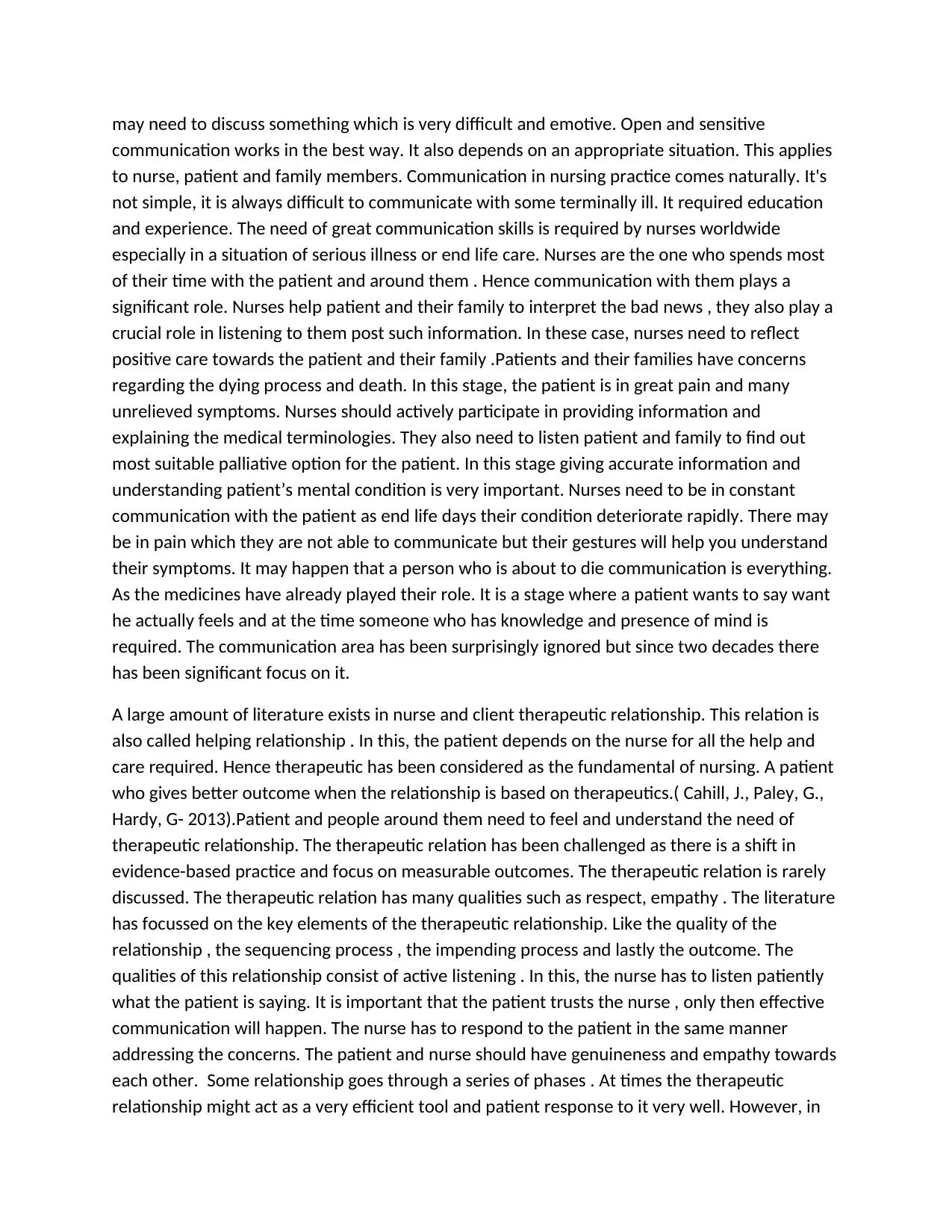
may need to discuss something which is very difficult and emotive. Open and sensitive
communication works in the best way. It also depends on an appropriate situation. This applies
to nurse, patient and family members. Communication in nursing practice comes naturally. It's
not simple, it is always difficult to communicate with some terminally ill. It required education
and experience. The need of great communication skills is required by nurses worldwide
especially in a situation of serious illness or end life care. Nurses are the one who spends most
of their time with the patient and around them . Hence communication with them plays a
significant role. Nurses help patient and their family to interpret the bad news , they also play a
crucial role in listening to them post such information. In these case, nurses need to reflect
positive care towards the patient and their family .Patients and their families have concerns
regarding the dying process and death. In this stage, the patient is in great pain and many
unrelieved symptoms. Nurses should actively participate in providing information and
explaining the medical terminologies. They also need to listen patient and family to find out
most suitable palliative option for the patient. In this stage giving accurate information and
understanding patient’s mental condition is very important. Nurses need to be in constant
communication with the patient as end life days their condition deteriorate rapidly. There may
be in pain which they are not able to communicate but their gestures will help you understand
their symptoms. It may happen that a person who is about to die communication is everything.
As the medicines have already played their role. It is a stage where a patient wants to say want
he actually feels and at the time someone who has knowledge and presence of mind is
required. The communication area has been surprisingly ignored but since two decades there
has been significant focus on it.
A large amount of literature exists in nurse and client therapeutic relationship. This relation is
also called helping relationship . In this, the patient depends on the nurse for all the help and
care required. Hence therapeutic has been considered as the fundamental of nursing. A patient
who gives better outcome when the relationship is based on therapeutics.( Cahill, J., Paley, G.,
Hardy, G- 2013).Patient and people around them need to feel and understand the need of
therapeutic relationship. The therapeutic relation has been challenged as there is a shift in
evidence-based practice and focus on measurable outcomes. The therapeutic relation is rarely
discussed. The therapeutic relation has many qualities such as respect, empathy . The literature
has focussed on the key elements of the therapeutic relationship. Like the quality of the
relationship , the sequencing process , the impending process and lastly the outcome. The
qualities of this relationship consist of active listening . In this, the nurse has to listen patiently
what the patient is saying. It is important that the patient trusts the nurse , only then effective
communication will happen. The nurse has to respond to the patient in the same manner
addressing the concerns. The patient and nurse should have genuineness and empathy towards
each other. Some relationship goes through a series of phases . At times the therapeutic
relationship might act as a very efficient tool and patient response to it very well. However, in
communication works in the best way. It also depends on an appropriate situation. This applies
to nurse, patient and family members. Communication in nursing practice comes naturally. It's
not simple, it is always difficult to communicate with some terminally ill. It required education
and experience. The need of great communication skills is required by nurses worldwide
especially in a situation of serious illness or end life care. Nurses are the one who spends most
of their time with the patient and around them . Hence communication with them plays a
significant role. Nurses help patient and their family to interpret the bad news , they also play a
crucial role in listening to them post such information. In these case, nurses need to reflect
positive care towards the patient and their family .Patients and their families have concerns
regarding the dying process and death. In this stage, the patient is in great pain and many
unrelieved symptoms. Nurses should actively participate in providing information and
explaining the medical terminologies. They also need to listen patient and family to find out
most suitable palliative option for the patient. In this stage giving accurate information and
understanding patient’s mental condition is very important. Nurses need to be in constant
communication with the patient as end life days their condition deteriorate rapidly. There may
be in pain which they are not able to communicate but their gestures will help you understand
their symptoms. It may happen that a person who is about to die communication is everything.
As the medicines have already played their role. It is a stage where a patient wants to say want
he actually feels and at the time someone who has knowledge and presence of mind is
required. The communication area has been surprisingly ignored but since two decades there
has been significant focus on it.
A large amount of literature exists in nurse and client therapeutic relationship. This relation is
also called helping relationship . In this, the patient depends on the nurse for all the help and
care required. Hence therapeutic has been considered as the fundamental of nursing. A patient
who gives better outcome when the relationship is based on therapeutics.( Cahill, J., Paley, G.,
Hardy, G- 2013).Patient and people around them need to feel and understand the need of
therapeutic relationship. The therapeutic relation has been challenged as there is a shift in
evidence-based practice and focus on measurable outcomes. The therapeutic relation is rarely
discussed. The therapeutic relation has many qualities such as respect, empathy . The literature
has focussed on the key elements of the therapeutic relationship. Like the quality of the
relationship , the sequencing process , the impending process and lastly the outcome. The
qualities of this relationship consist of active listening . In this, the nurse has to listen patiently
what the patient is saying. It is important that the patient trusts the nurse , only then effective
communication will happen. The nurse has to respond to the patient in the same manner
addressing the concerns. The patient and nurse should have genuineness and empathy towards
each other. Some relationship goes through a series of phases . At times the therapeutic
relationship might act as a very efficient tool and patient response to it very well. However, in
Paraphrase This Document
Need a fresh take? Get an instant paraphrase of this document with our AI Paraphraser
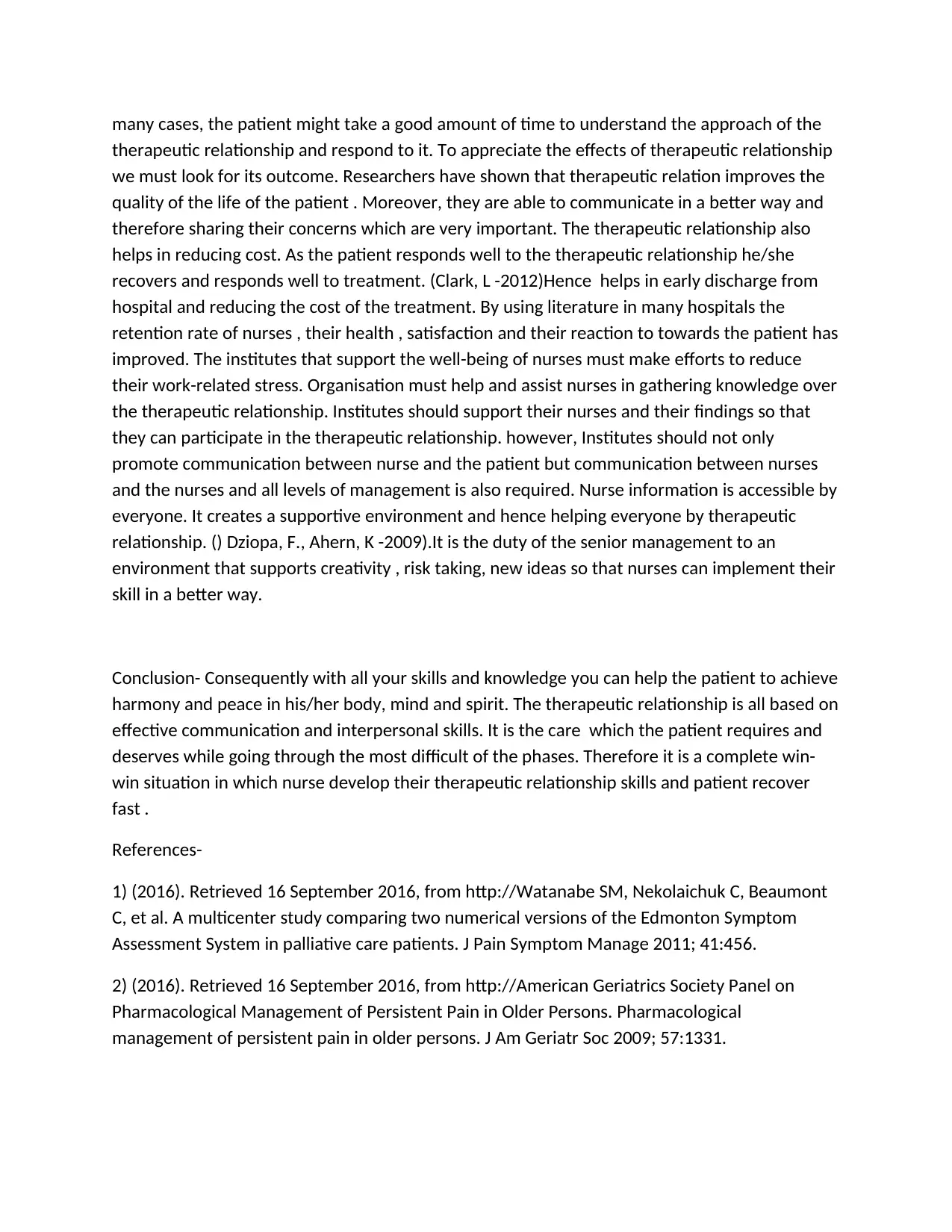
many cases, the patient might take a good amount of time to understand the approach of the
therapeutic relationship and respond to it. To appreciate the effects of therapeutic relationship
we must look for its outcome. Researchers have shown that therapeutic relation improves the
quality of the life of the patient . Moreover, they are able to communicate in a better way and
therefore sharing their concerns which are very important. The therapeutic relationship also
helps in reducing cost. As the patient responds well to the therapeutic relationship he/she
recovers and responds well to treatment. (Clark, L -2012)Hence helps in early discharge from
hospital and reducing the cost of the treatment. By using literature in many hospitals the
retention rate of nurses , their health , satisfaction and their reaction to towards the patient has
improved. The institutes that support the well-being of nurses must make efforts to reduce
their work-related stress. Organisation must help and assist nurses in gathering knowledge over
the therapeutic relationship. Institutes should support their nurses and their findings so that
they can participate in the therapeutic relationship. however, Institutes should not only
promote communication between nurse and the patient but communication between nurses
and the nurses and all levels of management is also required. Nurse information is accessible by
everyone. It creates a supportive environment and hence helping everyone by therapeutic
relationship. () Dziopa, F., Ahern, K -2009).It is the duty of the senior management to an
environment that supports creativity , risk taking, new ideas so that nurses can implement their
skill in a better way.
Conclusion- Consequently with all your skills and knowledge you can help the patient to achieve
harmony and peace in his/her body, mind and spirit. The therapeutic relationship is all based on
effective communication and interpersonal skills. It is the care which the patient requires and
deserves while going through the most difficult of the phases. Therefore it is a complete win-
win situation in which nurse develop their therapeutic relationship skills and patient recover
fast .
References-
1) (2016). Retrieved 16 September 2016, from http://Watanabe SM, Nekolaichuk C, Beaumont
C, et al. A multicenter study comparing two numerical versions of the Edmonton Symptom
Assessment System in palliative care patients. J Pain Symptom Manage 2011; 41:456.
2) (2016). Retrieved 16 September 2016, from http://American Geriatrics Society Panel on
Pharmacological Management of Persistent Pain in Older Persons. Pharmacological
management of persistent pain in older persons. J Am Geriatr Soc 2009; 57:1331.
therapeutic relationship and respond to it. To appreciate the effects of therapeutic relationship
we must look for its outcome. Researchers have shown that therapeutic relation improves the
quality of the life of the patient . Moreover, they are able to communicate in a better way and
therefore sharing their concerns which are very important. The therapeutic relationship also
helps in reducing cost. As the patient responds well to the therapeutic relationship he/she
recovers and responds well to treatment. (Clark, L -2012)Hence helps in early discharge from
hospital and reducing the cost of the treatment. By using literature in many hospitals the
retention rate of nurses , their health , satisfaction and their reaction to towards the patient has
improved. The institutes that support the well-being of nurses must make efforts to reduce
their work-related stress. Organisation must help and assist nurses in gathering knowledge over
the therapeutic relationship. Institutes should support their nurses and their findings so that
they can participate in the therapeutic relationship. however, Institutes should not only
promote communication between nurse and the patient but communication between nurses
and the nurses and all levels of management is also required. Nurse information is accessible by
everyone. It creates a supportive environment and hence helping everyone by therapeutic
relationship. () Dziopa, F., Ahern, K -2009).It is the duty of the senior management to an
environment that supports creativity , risk taking, new ideas so that nurses can implement their
skill in a better way.
Conclusion- Consequently with all your skills and knowledge you can help the patient to achieve
harmony and peace in his/her body, mind and spirit. The therapeutic relationship is all based on
effective communication and interpersonal skills. It is the care which the patient requires and
deserves while going through the most difficult of the phases. Therefore it is a complete win-
win situation in which nurse develop their therapeutic relationship skills and patient recover
fast .
References-
1) (2016). Retrieved 16 September 2016, from http://Watanabe SM, Nekolaichuk C, Beaumont
C, et al. A multicenter study comparing two numerical versions of the Edmonton Symptom
Assessment System in palliative care patients. J Pain Symptom Manage 2011; 41:456.
2) (2016). Retrieved 16 September 2016, from http://American Geriatrics Society Panel on
Pharmacological Management of Persistent Pain in Older Persons. Pharmacological
management of persistent pain in older persons. J Am Geriatr Soc 2009; 57:1331.
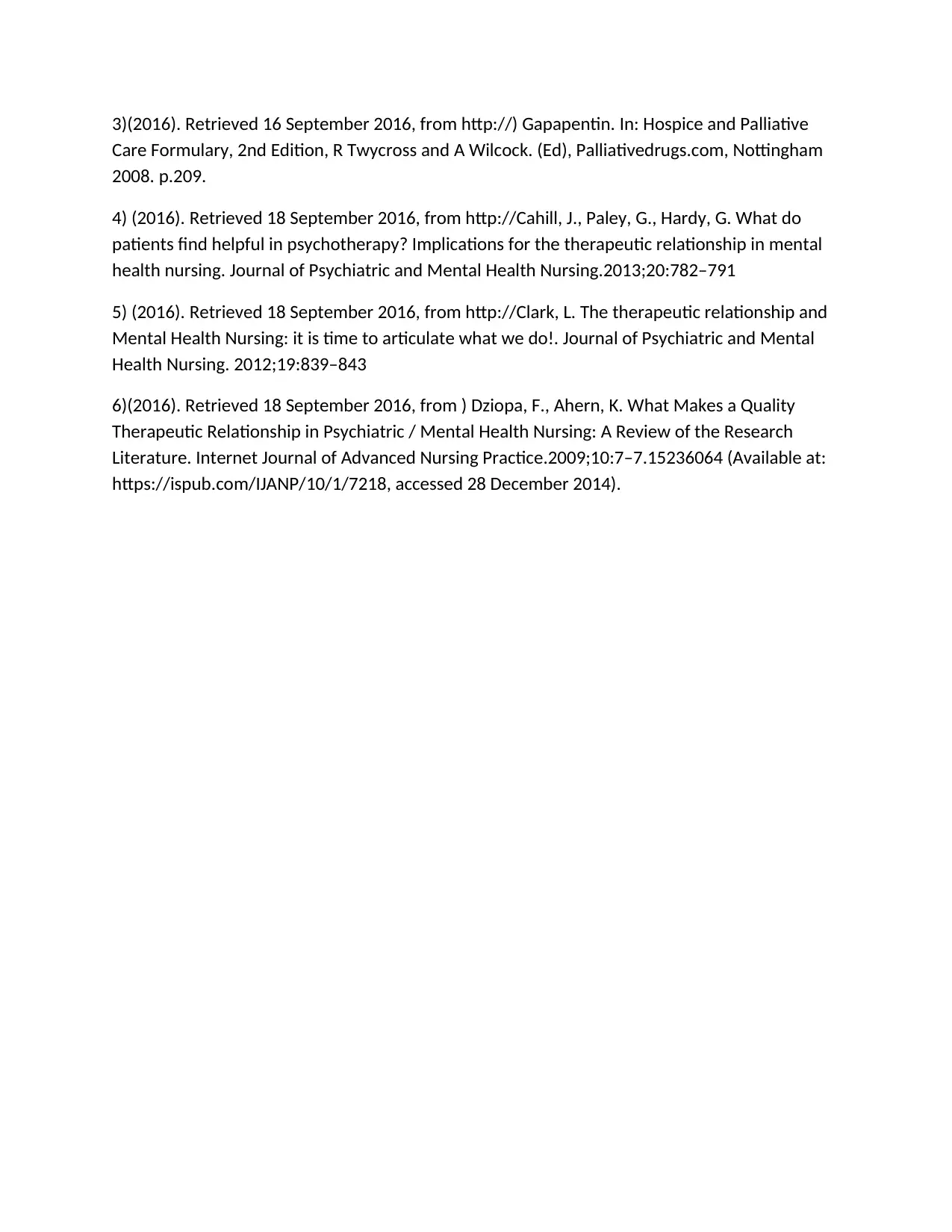
3)(2016). Retrieved 16 September 2016, from http://) Gapapentin. In: Hospice and Palliative
Care Formulary, 2nd Edition, R Twycross and A Wilcock. (Ed), Palliativedrugs.com, Nottingham
2008. p.209.
4) (2016). Retrieved 18 September 2016, from http://Cahill, J., Paley, G., Hardy, G. What do
patients find helpful in psychotherapy? Implications for the therapeutic relationship in mental
health nursing. Journal of Psychiatric and Mental Health Nursing.2013;20:782–791
5) (2016). Retrieved 18 September 2016, from http://Clark, L. The therapeutic relationship and
Mental Health Nursing: it is time to articulate what we do!. Journal of Psychiatric and Mental
Health Nursing. 2012;19:839–843
6)(2016). Retrieved 18 September 2016, from ) Dziopa, F., Ahern, K. What Makes a Quality
Therapeutic Relationship in Psychiatric / Mental Health Nursing: A Review of the Research
Literature. Internet Journal of Advanced Nursing Practice.2009;10:7–7.15236064 (Available at:
https://ispub.com/IJANP/10/1/7218, accessed 28 December 2014).
Care Formulary, 2nd Edition, R Twycross and A Wilcock. (Ed), Palliativedrugs.com, Nottingham
2008. p.209.
4) (2016). Retrieved 18 September 2016, from http://Cahill, J., Paley, G., Hardy, G. What do
patients find helpful in psychotherapy? Implications for the therapeutic relationship in mental
health nursing. Journal of Psychiatric and Mental Health Nursing.2013;20:782–791
5) (2016). Retrieved 18 September 2016, from http://Clark, L. The therapeutic relationship and
Mental Health Nursing: it is time to articulate what we do!. Journal of Psychiatric and Mental
Health Nursing. 2012;19:839–843
6)(2016). Retrieved 18 September 2016, from ) Dziopa, F., Ahern, K. What Makes a Quality
Therapeutic Relationship in Psychiatric / Mental Health Nursing: A Review of the Research
Literature. Internet Journal of Advanced Nursing Practice.2009;10:7–7.15236064 (Available at:
https://ispub.com/IJANP/10/1/7218, accessed 28 December 2014).
⊘ This is a preview!⊘
Do you want full access?
Subscribe today to unlock all pages.

Trusted by 1+ million students worldwide
1 out of 6
Related Documents
Your All-in-One AI-Powered Toolkit for Academic Success.
+13062052269
info@desklib.com
Available 24*7 on WhatsApp / Email
![[object Object]](/_next/static/media/star-bottom.7253800d.svg)
Unlock your academic potential
Copyright © 2020–2026 A2Z Services. All Rights Reserved. Developed and managed by ZUCOL.





